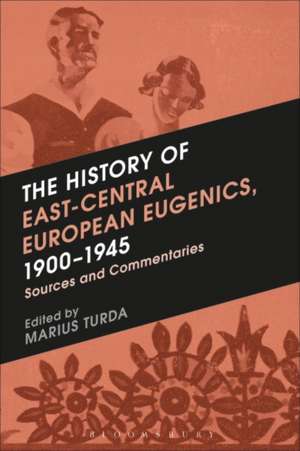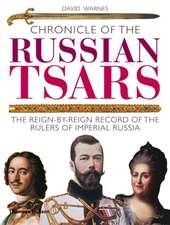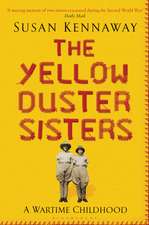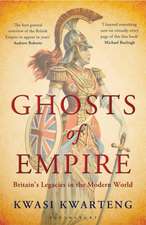The History of East-Central European Eugenics, 1900-1945: Sources and Commentaries
Editat de Marius Turdaen Limba Engleză Paperback – 22 feb 2017
| Toate formatele și edițiile | Preț | Express |
|---|---|---|
| Paperback (1) | 197.74 lei 43-57 zile | |
| Bloomsbury Publishing – 22 feb 2017 | 197.74 lei 43-57 zile | |
| Hardback (1) | 875.03 lei 43-57 zile | |
| Bloomsbury Publishing – 26 aug 2015 | 875.03 lei 43-57 zile |
Preț: 197.74 lei
Preț vechi: 301.14 lei
-34% Nou
Puncte Express: 297
Preț estimativ în valută:
37.84€ • 39.36$ • 31.24£
37.84€ • 39.36$ • 31.24£
Carte tipărită la comandă
Livrare economică 14-28 aprilie
Preluare comenzi: 021 569.72.76
Specificații
ISBN-13: 9781350038806
ISBN-10: 1350038806
Pagini: 656
Ilustrații: 20 bw illus
Dimensiuni: 156 x 234 x 34 mm
Greutate: 0.91 kg
Ediția:NIPPOD
Editura: Bloomsbury Publishing
Colecția Bloomsbury Academic
Locul publicării:London, United Kingdom
ISBN-10: 1350038806
Pagini: 656
Ilustrații: 20 bw illus
Dimensiuni: 156 x 234 x 34 mm
Greutate: 0.91 kg
Ediția:NIPPOD
Editura: Bloomsbury Publishing
Colecția Bloomsbury Academic
Locul publicării:London, United Kingdom
Caracteristici
Looks at key organisations, individuals and policies in nine countries, using numerous translated primary sources
Notă biografică
Marius Turda is Reader in 20th Century Central and Eastern European Biomedicine in the Department of History at Oxford Brookes University, UK. He is the author of Modernism and Eugenics (2010) and Eugenics and Nation in Early 20th Century Hungary (2014).
Cuprins
Introduction (Marius Turda, Oxford Brookes University)Part I - State-Orientated Eugenic Movements1. Austria Overview (Thomas Mayer, University of Vienna)Main Eugenicists and Key TextsGlossaryBibliography2. PolandOverview (Kamila Uzarczyk, Wroclaw Medical University)Main Eugenicists and Key TextsGlossaryBibliography3. Czechoslovakia (Bohemia and Moravia):Overview (Michal Simunek, Instiute for Contemporary History, Prague)Main Eugenicists and Key TextsGlossaryBibliography4. HungaryOverview (Marius Turda, Oxford Brookes University)Main Eugenicists and Key TextsGlossaryBibliography5. Romania I.Overview (Marius Turda, Oxford Brookes University)Main Eugenicists and Key TextsGlossaryBibliography6. Yugoslavia I. SloveniaOverview (Ana Cergol Paradiz, University of Ljubljana)Main Eugenicists and Key TextsGlossaryBibliography7. Yugoslavia II. CroatiaOverview (Vjera Duic, University of Zagreb)Main Eugenicists and Key TextsGlossaryBibliography8. Yugoslavia III. SerbiaOverview (Vladimir Petrovic, Institute for Contemporary History, Belgrade)Main Eugenicists and Key TextsGlossaryBibliographyPart II - Minority Eugenic Movements 9. Yugoslavia IV. Volksdeutsche Eugenics in VojvodinaOverview (Filip Krcmar, University of Novi Sad)Main Eugenicists and Key TextsGlossaryBibliography10. Romania II. Saxon Eugenics in Transylvania Overview (Tudor Georgescu, Oxford Brookes University)Main Eugenicists and Key TextsGlossaryBibliographyAppendix: Eugenic Societies in East-Central EuropeIndex
Recenzii
A number of things make this volume extremely useful for scholars of eugenics ... One immediate strength lies in the richness of the sources used ... Another is the nuanced and complex approach contributors take to exploring the autarchic eugenic traditions of their individual states ... while, at the same time, detailing attempts to establish common eugenic values ... This extremely well-written and thoroughly-researched volume will provide scholars of eugenics and related subjects with a wealth of information and primary sources. It makes a major contribution to the study of eugenic thought.
This excellent collection of essays is more than an introduction to East-Central European eugenics. It is a detailed investigation illuminating a rather dark period of European history ... [and] an essential read for scholars interested in both the general and specific aspects of European eugenics.
This volume succeeds admirably ... [in] provid[ing] an invaluable new perspective on the transmission and adaptation of eugenic ideas in countries, which, until recently have not been part of the so-called mainstream.
The History of East-Central European Eugenics is a landmark on the subject. Providing an excellent balance of commentaries, translated primary sources, biographies, and bibliographies for further reading, it is, moreover, a model for collected books of this type in any field. Scholars and students in a range of academic disciplines, including those in medical professions, will find this book not only a useful guide to the history of eugenics in East-Central Europe but also a window into the history of science and society in modern Europe.
With rich materials and insights, [this book] would certain[ly] help further the agenda of future comparative studies in the pursuit of a global history of eugenics.
Turda's book is truly fascinating. Having read it, I realise how little did I know about my neighbours' history and culture and indeed about the true history of my people too. I warmly recommend it.
[A] remarkable new edited collection ... With such a wide breadth of countries, languages and regions to examine, Turda has set himself up for a monumental task. The book's impressive length - 656 pages in hardback - is a testimony to how seriously he and his collaborators have made an effort to meet this challenge ... The breadth of translated materials, coupled with the valuable context offered by the biographical portraits and introductory sections, makes this book an invaluable resource for any scholars studying eugenics.
The tasks undertaken in these two books are remarkably ambitious and are executed with much sophistication and erudition ... The growing literature on eugenics will be significantly enriched by these two publications.
Public interest in the history of eugenics has so far focused on North America and Northern Europe. It has concentrated on extreme consequences like compulsory eugenic sterilization and racist population policies in Germany and the United States. This volume on eugenics in East-Central Europe presents an eye-opening variety of eugenic ideas and visions. It demonstrates the great range of eugenics as a factor in social, cultural and political developments in the first half of the 20th century - a historical lesson to remember in present debates about human reproduction policies.
Comprehensive, incisive, and authoritative, this ground-breaking book on East-Central European eugenics is essential reading. It establishes a whole new geography through which we can understand and analyse the most important socio-scientific endeavour of the twentieth century. Received wisdoms about eugenics and high modernity, authoritarian states, and urban populations are deeply questioned by this book, which turns Anglo-American presumptions on their head. Turda and his authors offer interpretations as well as translations that will serve historians of eugenics and public health well for generations.
This volume complicates the standard narrative of eugenics nicely. The oft told tale is that it was a matter of dominant groups imposing their definitions upon those they deemed inferior, however this book describes the multiple categories stretching across a vast range of boundaries, geographic and other. Essential reading for historians of eugenics.
Marius Turda and his colleagues have provided an invaluable resource for scholars seeking to understand the development of international eugenics in the first half to he twentieth century. This new focus on East Central European eugenics provides an important complement to the wealth of literature already existing on western European, Anglo-American and Latin American eugenics. Particularly valuable are the biographical sketches of important eugenicists in each country and translations of selections from their writings, previously inaccessible to scholars unfamiliar with languages such as Czech, Magyar, Polish, and Croatian. This work is thus a significant contribution to the primary source literature in an almost uncharted area in the history of eugenics.
This excellent collection of essays is more than an introduction to East-Central European eugenics. It is a detailed investigation illuminating a rather dark period of European history ... [and] an essential read for scholars interested in both the general and specific aspects of European eugenics.
This volume succeeds admirably ... [in] provid[ing] an invaluable new perspective on the transmission and adaptation of eugenic ideas in countries, which, until recently have not been part of the so-called mainstream.
The History of East-Central European Eugenics is a landmark on the subject. Providing an excellent balance of commentaries, translated primary sources, biographies, and bibliographies for further reading, it is, moreover, a model for collected books of this type in any field. Scholars and students in a range of academic disciplines, including those in medical professions, will find this book not only a useful guide to the history of eugenics in East-Central Europe but also a window into the history of science and society in modern Europe.
With rich materials and insights, [this book] would certain[ly] help further the agenda of future comparative studies in the pursuit of a global history of eugenics.
Turda's book is truly fascinating. Having read it, I realise how little did I know about my neighbours' history and culture and indeed about the true history of my people too. I warmly recommend it.
[A] remarkable new edited collection ... With such a wide breadth of countries, languages and regions to examine, Turda has set himself up for a monumental task. The book's impressive length - 656 pages in hardback - is a testimony to how seriously he and his collaborators have made an effort to meet this challenge ... The breadth of translated materials, coupled with the valuable context offered by the biographical portraits and introductory sections, makes this book an invaluable resource for any scholars studying eugenics.
The tasks undertaken in these two books are remarkably ambitious and are executed with much sophistication and erudition ... The growing literature on eugenics will be significantly enriched by these two publications.
Public interest in the history of eugenics has so far focused on North America and Northern Europe. It has concentrated on extreme consequences like compulsory eugenic sterilization and racist population policies in Germany and the United States. This volume on eugenics in East-Central Europe presents an eye-opening variety of eugenic ideas and visions. It demonstrates the great range of eugenics as a factor in social, cultural and political developments in the first half of the 20th century - a historical lesson to remember in present debates about human reproduction policies.
Comprehensive, incisive, and authoritative, this ground-breaking book on East-Central European eugenics is essential reading. It establishes a whole new geography through which we can understand and analyse the most important socio-scientific endeavour of the twentieth century. Received wisdoms about eugenics and high modernity, authoritarian states, and urban populations are deeply questioned by this book, which turns Anglo-American presumptions on their head. Turda and his authors offer interpretations as well as translations that will serve historians of eugenics and public health well for generations.
This volume complicates the standard narrative of eugenics nicely. The oft told tale is that it was a matter of dominant groups imposing their definitions upon those they deemed inferior, however this book describes the multiple categories stretching across a vast range of boundaries, geographic and other. Essential reading for historians of eugenics.
Marius Turda and his colleagues have provided an invaluable resource for scholars seeking to understand the development of international eugenics in the first half to he twentieth century. This new focus on East Central European eugenics provides an important complement to the wealth of literature already existing on western European, Anglo-American and Latin American eugenics. Particularly valuable are the biographical sketches of important eugenicists in each country and translations of selections from their writings, previously inaccessible to scholars unfamiliar with languages such as Czech, Magyar, Polish, and Croatian. This work is thus a significant contribution to the primary source literature in an almost uncharted area in the history of eugenics.









